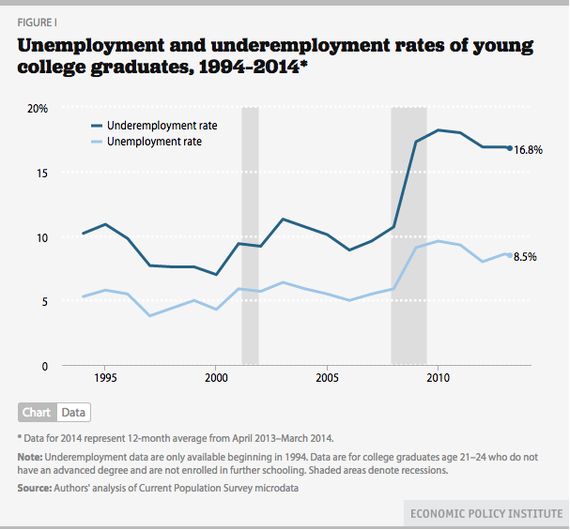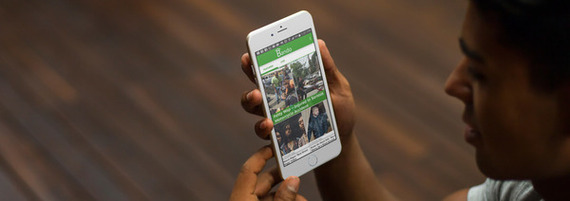
All industries are subject to change and the post-college job market is no exception. The transition from graduating college into the professional world has become much more of a selective tunnel.
But for those who have seen both sides of the road, there's clearly an un-quantifiable trend appearing in the hiring process for college graduates. Seemingly enough an educational pedigree has become a validation of sorts and employers are beginning to favor the entrepreneurial spirit just as much as they do the plaque itself.
The harsh reality is that a steady GPA and university mandated internships don't guarantee jobs in the current market. The Economic Policy Institute issued a study on youth joblessness and found that roughly 8.5 percent of college graduates between the ages of 21 and 24 were unemployed as of 2014.
Even though that figure is based on a 12-month average, it still highlights the particular dilemma at hand. The hiring process is conducted more through digital than ever before and recruiters/employers in business or related fields see hundreds of resumes a week. Setting yourself apart from the pack is done in communicating your value. Professional extracurricular projects are almost becoming a necessity to show your worth as a team member and an early application of the things learned from the classroom.
In May of 2014 I wrote a piece for the Huffington Post called, "Why Did I Work So Hard to Graduate?" (theatrically) outlining my real world experiences during my college years and how they hadn't equated to a salary at the time, after graduation. In the piece I wrote:
"That experience is rivaled by my latest endeavor of taking a semester of 24 credits while interning for Rhapsody Entertainment. Aside from personal bias, I think my resume represents both ends of the spectrum well. I've partnered an education with professional extracurricular activities, and guess what: I still don't have a job."
At my time of graduation, I had been freelance writing for the Huffington Post and Funny or Die for over a year, my good friend and I created a digital tech incubator called Kid Genius that kickstarted mobile app startups for various clients as well as our own ideas. We didn't outsource any of the work, from creating the products to producing the marketing content -- which not only pushed me to learn useful growth hacking skills but also helped me pay my way through college.
It was Kid Genius that landed me my first job as a creative officer for a digital marketing agency here in New York City. During school I worked diligently to learn through experience and strived to put myself on to projects that would position my personal brand and grow a respectable portfolio.
More jobs are asking for candidates to have previous work experience, giving the idea that the bare minimum won't suffice. Entrepreneurship is a mindset and if demonstrated on an individual basis during school then it will increase your chances of a professional opportunity after graduation.
Why Experience During School Matters
Shows initiative. Finding experience isn't easy, it takes a good deal of networking in route to a good freelance position or work related program. Whether it's a startup or a tenured organization, every employer wants a dedicated, passionate individual and early work experience demonstrates that kind of personality.
Identifies a professional focus. Many graduates aren't sure of what they can actually see themselves doing and that can make it hard for employers to visualize as well. If you're into computer science, create a mobile app of your own to add projects to your portfolio. If you're a writer, creating a great catalogue of content for your school newspaper could solidify your next role to write feature stories or on-site reporting. Finding early work experience helps you establish your niche within your industry which is a nice compliment to your degree.
Shows your value. You've taken your craft seriously if you're able to contribute at a professional capacity already. But this experience is also valuable because it's the beginning of your personal brand. You'll learn skills that you can take with you and you'll see the difference between your brand and your career.
Helps establish the right relationships. Networking will play a major factor throughout the rest of your career and collaborating through work is a great way to foster long-term professional relationships. These ties could lead to a future job or notable references that come in handy during the hiring process.
Communicating your value is crucial when seeking a job right out of college. You've shown your determination in earning your B.A. but it takes a credible resume and portfolio to prove beneficial for a recruiting company. Explore adding the entrepreneurial element to your resume and you'll find that your professional projects will speak for your knowledge and skillset.


